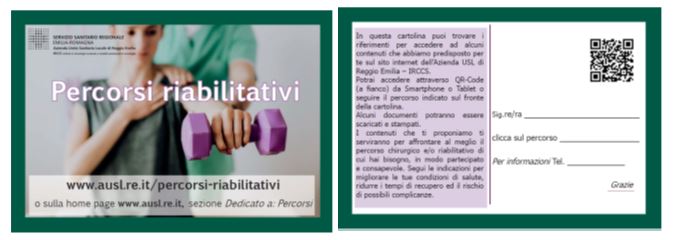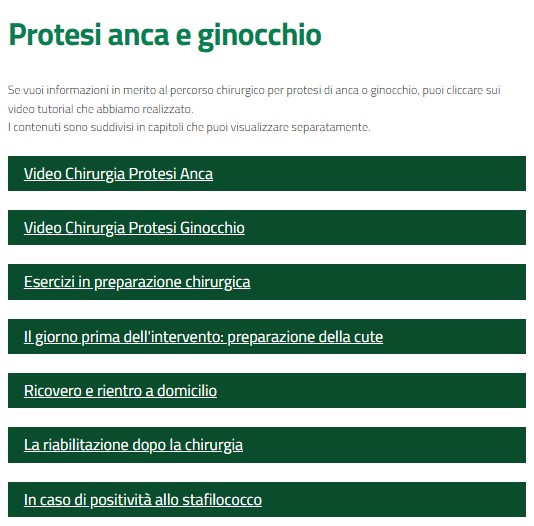CASALINI GIULIA – ( Care Management Unit, Azienda Unità Sanitaria Locale – IRCCS di Reggio Emilia – Italy)
MAGNANINI FRANCESCA – ( Care Management Unit, Azienda Unità Sanitaria Locale – IRCCS di Reggio Emilia – Italy)
DE SANTIS ANNAMARIA – (Bachelor Degree in Digital Education – Modena and Reggio Emilia University – Italy)
TEDESCHI CINZIA – (Bachelor Degree in Digital Education – Modena and Reggio Emilia University – Italy)
PINNA VANESSA – (Bachelor Degree in Digital Education – Modena and Reggio Emilia University – Italy)
FRANCESCA CIPOLLI – (Bachelor Degree in Physiotherapy – Modena and Reggio Emilia University – Italy)
RANCATI JACOPO MATTEO – ( Care Management Unit, Azienda Unità Sanitaria Locale – IRCCS di Reggio Emilia – Italy)
Therapeutic education processes in the perioperative phases are fundamental for patient engagement in developing self-care approaches aimed at improving rehabilitation outcomes. Literature shows that patients’ conscious participation in their therapeutic journey reduces recovery times, the risk of complications, and the use of healthcare resources. In our institution, the preparation of patients scheduled for hip and knee replacement surgery includes the use of numerous printed informational materials and varying approaches across different surgical facilities within the organization. The purpose of this study is to analyze the informational needs of patients, update and digitize the already available materials, and organize them on a single computerized platform. This platform will integrate audiovisual informational support to facilitate the therapeutic education process and an informed choice of post-surgical rehabilitation pathways.
For the reorganisation of the existing informational material, a collection and review of the contents available was carried out at the various hospital facilities involved in the surgical line. For the informative needs analysis, a questionnaire was prepared with the involvement of experienced digital health professionals. The questionnaire will be administered over a period of 2 months anonymously to a sample of patients undergoing rehabilitation treatment following surgery, with adherence on a voluntary basis. The data emerged will be processed with descriptive statistical analysis, in order to identify the prevalent and most significant needs.
In parallel, semi-structured interviews will be conducted with some professionals involved in the programme, which will be analysed using qualitative analysis methodologies. The contents that emerged from both sources will be compared and used to create a story-board as the basis for the audio-visual, that will be realised with the technical, technological and methodological support of experienced professionals.
The digital platform for organizing the existing informational supports has already been created and made available online. The content has been reviewed and updated thanks to the direct participation of the professionals involved in patient care throughout the various phases of the therapeutic process. The results of the questionnaires and interviews will be available by summer 2024. The storyboard will be created with the intent to align the communication needs of professionals with the patients’ informational needs. The audiovisual material is expected to be completed by the end of 2024. The digitization of informational supports is part of a general review of care pathways, with the long-term objective of reducing the average length of hospital stays and increasing discharges to home (with the simultaneous activation of outpatient rehabilitation pathways). Both indicators will be monitored using data generated from the hospital discharge form (SDO).
Collaboration with experts in digital education is strategic in analyzing the communication needs within healthcare pathways to align the needs of professionals with those of patients, and in creating more effective tools and informational supports.
The digitization of informational supports and their availability on a single electronic platform aligns with the PNRR processes impacting the healthcare system, facilitating accessibility and usability at every stage of the pathway, while reducing indirect logistical costs (printing, storage, distribution) and environmental impact.
The implementation of therapeutic education processes promotes the proactive involvement of patients in their own care pathway, increasing their empowerment and adherence to self-care processes. These strategies help improve the appropriateness of the use of rehabilitation settings, promote outpatient trajectories, and reduce the overall economic impact of the care pathway.

